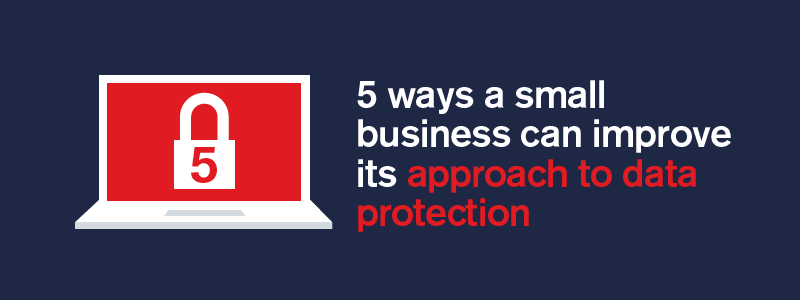The importance of having an awareness and a comprehensive understanding of data protection in 2017 has never been more essential, with the recent ransomware attack on the NHS* a prime example which displays the need for full protection. Discover our top 5 tips to help you further protect your businesses data and privacy online.
1) Ensure your operating system is always running on the most up-to-date version
We're all guilty to clicking ‘later’ or ‘remind me tomorrow’ on those never ending pop-ups reminding us to update our software. However, these often-annoying notifications are only in place to improve the security on our devices as they provide essential and often critical, updates and patches that provide fixes, which if left unattended, are susceptible to damage. It’s best practice and highly recommended to turn on automatic updates.
2) Protect your sensitive data by encrypting it
Data is one of your small businesses most valuable assets and you should be actively taking precautions to protect it. Encryption safeguards your data and ensures that it remains unreadable and protected. If you are using a portable USB device or physical hard drive, ensure that the all sensitive data stored on these devices is protected and secure, as this ensures that your data isn’t at risk if the device is lost, stolen or damaged.
3) Use antivirus software
Antivirus software can provide essential protection your business against a plethora of threats. Antivirus software is ideal for baseline protection against well-known viruses, malware and phishing. Although there are free options available it is worth investing in a reputable package, most are at a small user per month cost and will protect you from known and unknown viruses, giving your business robust protection and peace of mind. Symnatec* is a great place to start.
4) Use a unique, complex password for every account you own
Similarly to the constant software updates, we find ourselves having to change our passwords on a regular basis. Our passwords are the one of the few barriers that protect us against hackers and with '123456' and 'password' amongst the most common passwords* it’s essential to create a complex password to maximise security. Good advice for creating secure passwords is taking an usual sentence, such as "When it’s 21 degrees outside, I put the washing out" and taking the first letter of each word and combine it with punctuation: Wi21-doiPtwo. Don’t allow hackers the opportunity to access your sensitive data.
5) Understand and avoid Phishing attacks
Social engineered attacks are an increasingly popular tactic for cyber criminals, with Phishing becoming the number one delivery vehicle for ransomware. Why? Well, people are naturally trusting. Attackers are now targeting your businesses data to extract it from your business and create problems that, depending on the severity, could be permanently detrimental to your company. Phishing mail is quick and easy for an attacker to create, with subject lines such as 'Mandatory Compliance Survey from IT Department', if you don’t know the tell-tale signs of phishing mail, then it’s no wonder why this form of cyber-attack is on the rise. Look out for unknown senders, unusual domain names or mail with attachments that you didn’t request and regularly educate your employees to keep alert.
References:
* www.theguardian.com/society/2017/may/12/hospitals-across-england-hit-by-large-scale-cyber-attack
* https://blog.keepersecurity.com/2017/01/13/most-common-passwords-of-2016-research-study/

